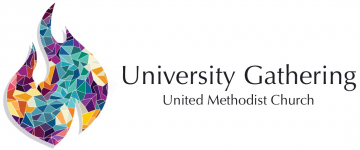News
Transfiguration vs Disfiguration
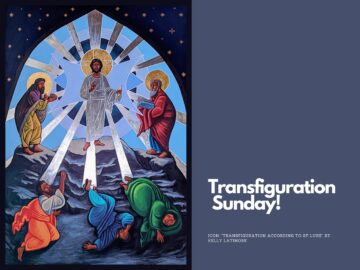
Kindred in Christ,
This Sunday is Transfiguration Sunday.
Yet most of us know the disfiguration of empire better than the transfiguration of Christ.
Empire disfigures bodies.
Borders.
Budgets.
Truth.
We see it in policies that decide who is protected and who is afraid. We see it when immigration enforcement tears families apart. We see it when public systems prize control over compassion, and when truth itself feels warped by those in power.
The world is not neutral. It shapes us. Forms us. And often distorts what humanity is meant to be.
That is the world into which this Sunday’s Gospel speaks.
In Matthew 17:1–9, Jesus takes Peter, James, and John up a mountain. There his appearance changes. His face shines. His clothes blaze with light. Moses and Elijah appear, the Law and the Prophets standing beside him.
Then a cloud descends.A voice speaks: “This is my Son, the Beloved. Listen to him.”
And when the cloud lifts, they see only Jesus.
This is not spectacle. It is revelation.
In a world shaped by empire, the disciples glimpse another way. Not domination. Not fear. But radiant, embodied love. When they see only Jesus, it is not a rejection of their tradition, but its fulfillment. Law, prophecy, and hope find their center in him.
Transfiguration presses us with hard questions.
If our faith does not lead us toward mercy, what are we seeing?
If our theology does not bend toward compassion, what is it forming us into?
The light on the mountain does not erase the valley. It prepares us to return with clearer vision and steadier courage.
Standing on the threshold of Lent, we are invited to listen again. To look again. To let Christ’s light clarify what has been distorted.
I hope you will join us as we follow Jesus down the mountain and into the work of love and justice.
Alongside you,
Pastor Paul Ortiz
You are the Salt of the Earth! Salt Out Ice!
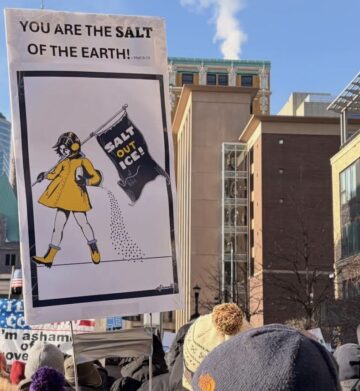
Kindred in Christ,
I recently came across an image from a public witness that has stayed with me. A sign reads, “You are the salt of the earth,” and beneath it is an image of a figure scattering salt with the words “Salt out ICE.” It is striking, provocative, and deeply rooted in Jesus’ own words from this coming Sunday’s Gospel, Matthew 5:13–20.
Jesus’ declaration, “You are the salt of the earth… You are the light of the world,” is not sentimental encouragement. In Jesus’ time, salt preserved life and light kept people from stumbling in the dark. These metaphors point to a faith that is public, tangible, and costly. Salt changes what it touches. Light exposes what has been hidden and helps people find their way.
In a moment when immigrants and so many vulnerable neighbors live under the weight of fear, these words press on us with urgency. To be salt and light today is to resist systems that dehumanize and to stand with those whose lives are treated as expendable. It is to insist, through our presence and our practices, that every person bears God’s image and deserves dignity, safety, and belonging. Jesus does not call us to withdraw from the world, but to live our faith so fully that it cannot help but be seen.
This Sunday is also a special moment for our congregation as we welcome our own Keith Eisenbrey to the pulpit to preach his first sermon. As he helps us reflect more deeply on what it means to be salt and light, we look forward to how the Spirit will speak through his voice and invite us into deeper faithfulness.
I hope you will join us this Sunday for worship. Come to listen, to pray, to sing, and to be reminded that following Jesus is not about hiding our light, but about letting it shine for the sake of a hurting world.
Alongside you,
Pastor Paul Ortiz
Ash Wednesday 2026
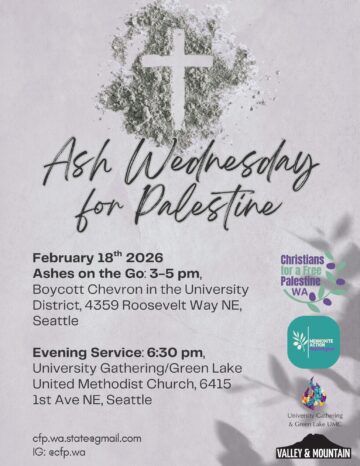
🌿 Ash Wednesday: Ashes on the Go + Evening Worship
🕒 Ashes on the Go: 3–5 PM
📍 Chevron, 4359 Roosevelt Way NE, U-District, Seattle
🕡 Evening Service: 6:30 PM
📍 University Gathering / Green Lake UMC, 6415 1st Ave NE, Seattle
This Ash Wednesday, we put ashes on our foreheads as a reminder to let go of oppression and follow Christ’s call to a world where everyone thrives.
Stop by Chevron in the U-District between 3–5 PM for ashes and a witness calling Chevron to divest from systems that fuel violence, apartheid, and climate harm.
Join us at 6:30 PM for worship, lament, and reflection. We grieve state violence from Seattle to Palestine and recommit to justice and collective liberation. Get involved with Christians for Free Palestine HERE.
✨ Come as you are. All are welcome.
First Nations and Micah 6:8
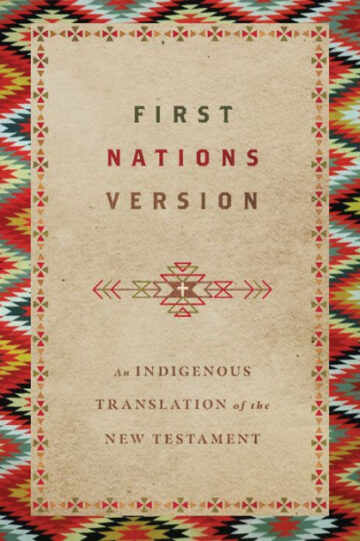
Kindred in Christ,
This Sunday, come and walk the good road with us in a worship experience full of meaning and hope.
Our gathering will be shaped by Micah’s ancient and urgent question, What does the Holy One require of us? (Micah 6:1-8), and by Jesus’ words from the Beatitudes, heard through the beautiful First Nations Translation of the Bible (Matthew 5:1-12). This translation invites us onto what it calls the good road—a path of justice, kindness, humility, and deep listening to one another, to the land, and to histories that did not begin with us. As it reminds us, “Creator’s blessing rests on those who hunger and thirst for wrongs to be made right again. They will eat and drink until they are full.”
We are especially honored to welcome Ken Workman, fifth generation grandson of Chief Seattle, as our guest speaker. Ken is a teacher, storyteller, and advocate for the Duwamish people. His presence among us is part of our ongoing commitment to relationship, truth telling, and faithful action.
We give thanks for Judy LeBlanc and her leadership of the Earthkeepers initiative. Earthkeepers continues to invite us into a deeper discipleship rooted in care for the earth, justice for Indigenous communities, and walking more gently on the land we share, in partnership with and learning from the Duwamish people.
This Sunday’s worship will remind us that listening itself is a spiritual practice and that following Jesus means learning how to walk humbly, kindly, and attentively together.
Come with open hearts.
Come ready to listen and learn.
Come expecting to be moved into meaningful action.
This is a Sunday you do not want to miss.
Alongside you,
Pastor Paul Ortiz
Called After Loss
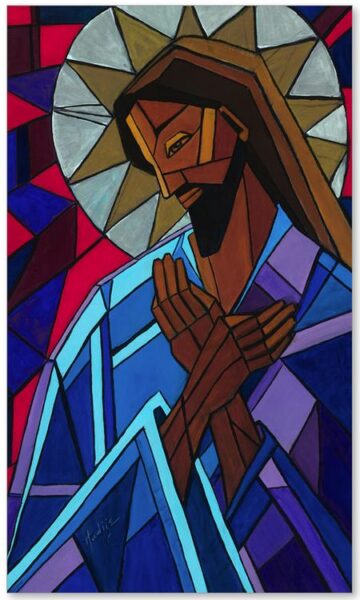
Jesus Prays Alone by Mary DuCharme
Kindred in Christ,
This Sunday we will continue our Epiphany journey with a story that begins not with clarity or celebration, but with loss.
In Matthew’s Gospel, Jesus hears that John the Baptist has been arrested. Jesus knows that John’s arrest is not temporary, but part of a path that so often ends in the death of prophets—and of his beloved friend. Before he preaches, before he gathers followers, before he heals or teaches, Jesus withdraws (Matthew 4:12-23). He pauses. He makes space for grief, prayer, and reflection. We often imagine Jesus surrounded by crowds, but throughout the Gospels we see him returning again and again to solitude, to prayer, and to time alone with God.
Only then does Jesus step forward to proclaim that the kingdom of heaven has come near. Only then does he call others to follow.
This Sunday we will reflect on what it means to listen for God’s call in seasons of grief, uncertainty, and vulnerability. We will explore how Jesus models a faith that does not rush past pain, how Psalm 27 gives voice to honest prayer in fearful times, and how discipleship is less about having everything figured out and more about trusting God’s presence as we move forward together.
We will also reflect on Jesus’ invitation to become fishers of people, not as a call to pressure or persuade, but as an invitation to live in ways that make space for others to experience the nearness of God’s kingdom.
If you are carrying grief, questions, restlessness, or simply the weight of the world, you are not alone and you are welcome. This will be a service grounded in honesty, hope, and the gentle light that meets us where we are.
I hope you will join us this Sunday as we listen again for the voice of Christ, who meets us in the midst of life and still says, “Follow me.”
Alongside you,
Pastor Paul Ortiz
